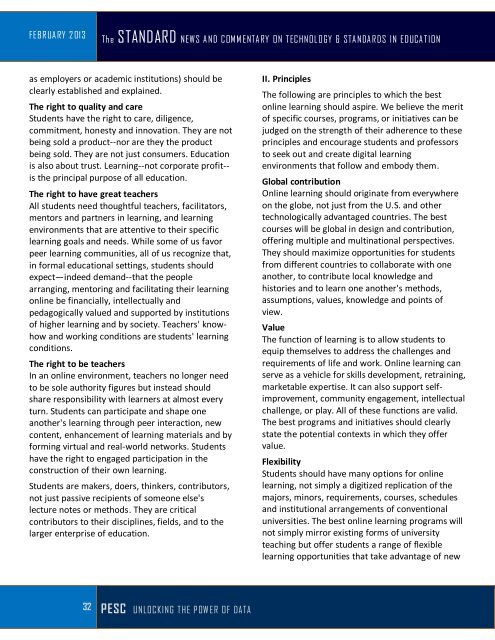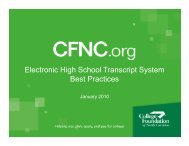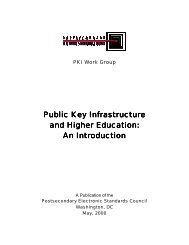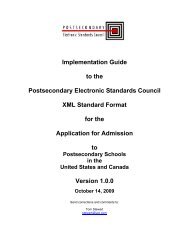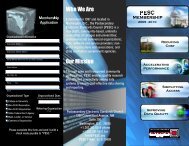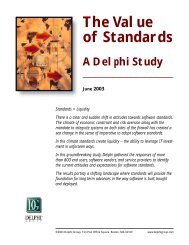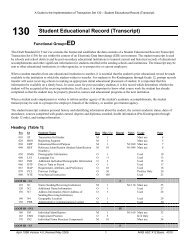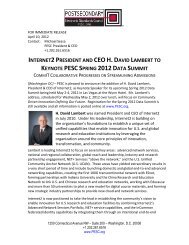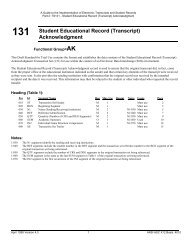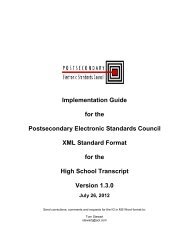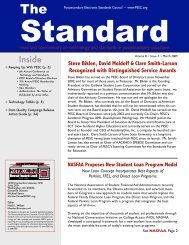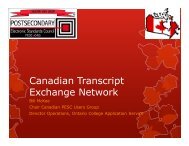February 2013 - PESC
February 2013 - PESC
February 2013 - PESC
You also want an ePaper? Increase the reach of your titles
YUMPU automatically turns print PDFs into web optimized ePapers that Google loves.
FEB RUA RY 2 013<br />
Th e STANDARD NEWS A ND C OM M ENTA RY ON T EC HNOL OGY & STA NDA RDS IN EDUCA T ION<br />
as employers or academic institutions) should be<br />
clearly established and explained.<br />
The right to quality and care<br />
Students have the right to care, diligence,<br />
commitment, honesty and innovation. They are not<br />
being sold a product--nor are they the product<br />
being sold. They are not just consumers. Education<br />
is also about trust. Learning--not corporate profit--<br />
is the principal purpose of all education.<br />
The right to have great teachers<br />
All students need thoughtful teachers, facilitators,<br />
mentors and partners in learning, and learning<br />
environments that are attentive to their specific<br />
learning goals and needs. While some of us favor<br />
peer learning communities, all of us recognize that,<br />
in formal educational settings, students should<br />
expect—indeed demand--that the people<br />
arranging, mentoring and facilitating their learning<br />
online be financially, intellectually and<br />
pedagogically valued and supported by institutions<br />
of higher learning and by society. Teachers' knowhow<br />
and working conditions are students' learning<br />
conditions.<br />
The right to be teachers<br />
In an online environment, teachers no longer need<br />
to be sole authority figures but instead should<br />
share responsibility with learners at almost every<br />
turn. Students can participate and shape one<br />
another's learning through peer interaction, new<br />
content, enhancement of learning materials and by<br />
forming virtual and real-world networks. Students<br />
have the right to engaged participation in the<br />
construction of their own learning.<br />
Students are makers, doers, thinkers, contributors,<br />
not just passive recipients of someone else's<br />
lecture notes or methods. They are critical<br />
contributors to their disciplines, fields, and to the<br />
larger enterprise of education.<br />
II. Principles<br />
The following are principles to which the best<br />
online learning should aspire. We believe the merit<br />
of specific courses, programs, or initiatives can be<br />
judged on the strength of their adherence to these<br />
principles and encourage students and professors<br />
to seek out and create digital learning<br />
environments that follow and embody them.<br />
Global contribution<br />
Online learning should originate from everywhere<br />
on the globe, not just from the U.S. and other<br />
technologically advantaged countries. The best<br />
courses will be global in design and contribution,<br />
offering multiple and multinational perspectives.<br />
They should maximize opportunities for students<br />
from different countries to collaborate with one<br />
another, to contribute local knowledge and<br />
histories and to learn one another's methods,<br />
assumptions, values, knowledge and points of<br />
view.<br />
Value<br />
The function of learning is to allow students to<br />
equip themselves to address the challenges and<br />
requirements of life and work. Online learning can<br />
serve as a vehicle for skills development, retraining,<br />
marketable expertise. It can also support selfimprovement,<br />
community engagement, intellectual<br />
challenge, or play. All of these functions are valid.<br />
The best programs and initiatives should clearly<br />
state the potential contexts in which they offer<br />
value.<br />
Flexibility<br />
Students should have many options for online<br />
learning, not simply a digitized replication of the<br />
majors, minors, requirements, courses, schedules<br />
and institutional arrangements of conventional<br />
universities. The best online learning programs will<br />
not simply mirror existing forms of university<br />
teaching but offer students a range of flexible<br />
learning opportunities that take advantage of new<br />
32 <strong>PESC</strong> UNLOC K ING T HE P OW ER OF DATA


